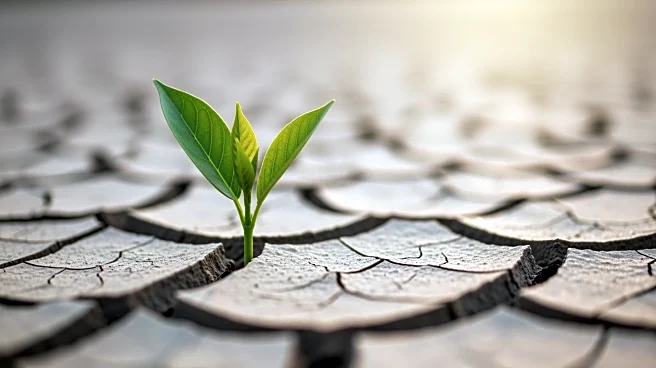What's Happening?
Thousands of climate protesters have gathered outside the COP30 climate talks in Belém, Brazil, to demand urgent action on climate change. The demonstrators, including indigenous communities, Brazilian
youth groups, and international activists, carried signs and chanted slogans such as 'free the Amazon.' The protest featured symbolic elements like three giant coffins labeled Oil, Coal, and Gas, accompanied by figures dressed as grim reapers. This marks the first time since 2021 that public protests have been allowed outside the UN climate talks, as previous summits were held in countries that restricted such activities. The protests coincide with ongoing negotiations among nearly 200 countries aimed at addressing climate change, though progress has been slow. The event has been dubbed the 'indigenous people's COP,' highlighting the critical role of indigenous groups in protecting biodiversity and forests.
Why It's Important?
The protests at COP30 underscore the growing frustration among climate activists and indigenous groups over the perceived inaction of global leaders in addressing climate change. The presence of a significant number of delegates from fossil fuel companies at the summit has further fueled concerns about the influence of the fossil fuel industry on climate policy. Indigenous communities, who are often on the frontlines of climate change impacts, are demanding legal ownership of their territories to better protect them from deforestation and resource extraction. The protests highlight the urgent need for concrete actions and commitments from world leaders to transition away from fossil fuels and address the climate crisis effectively.
What's Next?
As the COP30 talks continue, there is pressure on participating countries to reach a consensus on strategies to reduce reliance on fossil fuels and fulfill past climate commitments. The Brazilian government, hosting the talks, faces scrutiny after granting permission for oil exploration at the Amazon's mouth, which contradicts the summit's goals. The outcome of the negotiations will be closely watched by environmental groups and the public, who are demanding accountability and tangible progress in combating climate change.
Beyond the Headlines
The protests at COP30 also bring attention to the broader issue of representation and inclusion of indigenous voices in global climate discussions. Despite being labeled the 'indigenous people's COP,' many indigenous groups feel their concerns are not adequately addressed. This highlights the need for more inclusive and equitable climate policies that recognize the rights and contributions of indigenous communities in environmental conservation.









